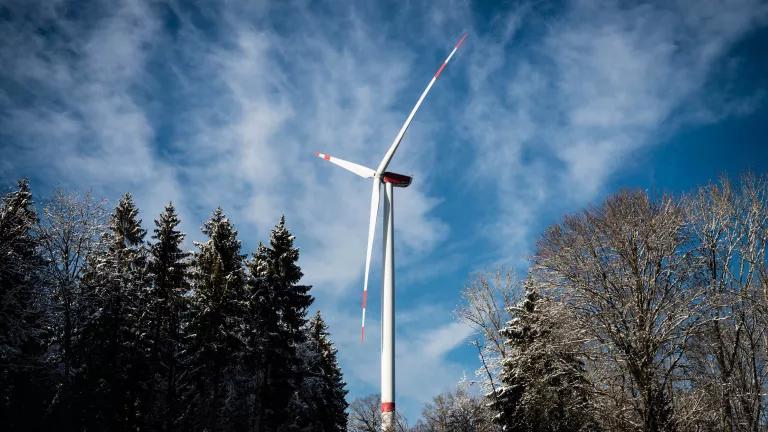Senators Urge New England Grid Operator to Address Climate
Eight U.S. Senators, all six New England state governors, power generators, and others are calling on New England's power grid operator to start giving the climate crisis the attention it demands.

New England’s grid operator should work with states and stakeholders to build the clean energy grid of the future.
Photo: Ferdinand Stöhr on Unsplash
It’s time for New England’s power grid operator, ISO New England, to start giving the climate crisis the attention it demands. In a letter yesterday, eight U.S. Senators called on ISO New England President Gordon van Welie to do just that, joining similar calls from all six New England state governors, the region’s power generators, and others.
In their letter, the Senators, from Connecticut, Maine, Massachusetts, Rhode Island, and Vermont, raise concerns about ISO New England rules and practices “aimed at preserving the status quo of a fossil fuel-centered” electricity sector. Such actions are not only dangerous—polluting power plants are one of the largest contributors to a destabilizing climate—they’re against the will of New England voters who demand climate action through state laws to grow clean energy.
As the Senators note, by frustrating these state policies, the ISO violates its responsibility “to facilitate this clean energy transition and help achieve the region’s climate goals in a cost-effective manner that ensures reliability and just and reasonable rates for consumers.”
Their letter cites specific examples of the ISO’s problematic actions:
- Competitive Auctions with Sponsored Policy Resources: In 2018, ISO New England, which oversees the region’s competitive power markets, adopted market rules, known as “Competitive Auctions with Sponsored Policy Resources,” that prevent clean energy built under state laws from fairly competing to deliver power. These rules force clean energy to bid in the regional market at artificially high prices, making clean resources uncompetitive with fossil generators. Under these circumstances, clean energy is only recognized in the market if the developers of clean resources buy out fossil units—a windfall for dirty generators—and only if the owners of those polluting units agree to retire. These rules don’t just stifle clean energy: they threaten to cost consumers hundreds of millions if not billions of dollars in higher electricity rates.
- Inventoried Energy Program: Earlier this year, ISO New England adopted an “Inventoried Energy Program” that the Senators note “will force consumers to pay millions of dollars to existing, polluting power plants with on-site fuel supplies, such as oil, coal, or liquefied natural gas.” The ISO justified this program in the name of winter “fuel security”—ensuring enough energy resources are available to meet electricity demand during winter storms. By only compensating resources that rely on fuel or “inventoried energy” to generate electricity, however, the ISO ignores the proven benefits of fuel-free resources like offshore wind in meeting winter demand. The ISO also ignores that on-site fuel is no guarantee that fossil generators will be available when needed. During past winters, igniter failures, frozen coal piles, frozen boiler tubes, and other issues have kept fossil generators offline, even with access to fuel.
- Energy Security Improvements Project: The ISO is now doubling down on fuel security (which it also refers to as “energy security”) through its “Energy Security Improvements” project. This initiative, which again appears primarily to benefit certain fossil generators, has consumed the vast majority of the ISO’s markets focus in 2019 and is projected to continue to do so through 2020. This singular focus comes at the expense of initiatives to harmonize the region’s electricity markets with the states’ climate policies. And this inordinate focus on fuel security continues despite analysis commissioned by the ISO which projects no energy shortfalls under a wide range of future scenarios.
For years, ISO New England has implemented market rules that ignore the benefits of clean energy and frustrate states’ efforts to address climate change, while hiding behind the argument that its mission is limited to ensuring reliability and fair competition, rather than achieving environmental goals.
The ISO cannot escape its responsibility so easily. New England states have direct policymaking authority to address climate change. But the ISO is not a passive observer. In setting power market rules, ISO New England chooses whether to facilitate state policies or undermine them. And when ISO New England acts contrary to state laws and adopts unjust rules that raise prices and lock in a grid that is too polluting, it violates the Federal Power Act, which requires it to act in the public interest and facilitate the cost-effective integration of clean energy.
To solve the climate crisis, New England’s grid must transform. Fossil power must give way to clean, renewable energy like wind and solar power, improvements in power management, energy storage, and efficiency. The grid must accommodate new electric loads, including vehicles and heating, to replace the polluting technologies of the past.
This transition holds tremendous promise: We’ve seen that technologies like offshore wind, energy storage, and energy efficiency can improve reliability and make our grid more efficient in addition to cleaning the air. With the right market frameworks, ISO New England could help the region get where it needs to go on climate with a grid that is reliable, affordable, and clean.
It’s time for the ISO to step up to this challenge. In 2020, New England’s grid operator should work with states and stakeholders on solutions by dedicating its resources to build and prepare for the grid of the future instead of the grid of the past.


